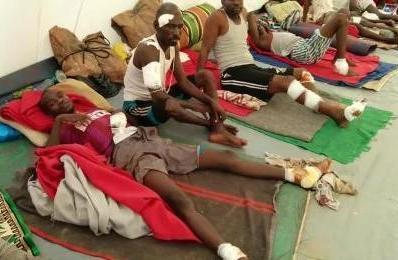Sudan condemns Bentiu atrocities, accuses Juba of using Darfur rebels
April 23, 2014 (KHARTOUM) – The Sudanese government has denounced the killing of Sudanese nationals after South Sudanese rebels took control of Unity state capital Bentiu earlier this month.

In a new development in the relations between the two countries after the eruption of South Sudan crisis, Sudan’s foreign ministry issued a strongly worded statement on Wednesday rejecting claims that civilians were mistakenly killed because Machar’s forces thought they belonged to Darfur rebel groups, said to be fighting alongside president Salva Kiir’s forces.
The statement called on warring parties in South Sudan to respect international and humanitarian laws, demanding an immediate investigation into the ongoing assaults against Sudanese nationals in Bentiu.
In a statement issued on 21 April, the UN Mission in South Sudan (UNMISS)confirmed that more than 200 civilians had reportedly been killed and over 400 wounded at Bentiu Mosque when the town changed hands on 15 April.
UNMISS also accused the rebel SPLM-In-Opposition of separating civilians along tribal lines, saying Darfuris were specifically targeted and killed at the hospital along with other civilians.
However, the rebel commander in charge of Unity state’s military division 4, Maj. Gen. James Koang Chol, dismissed the accusation as “lies” when contacted by Sudan Tribune by phone on Sunday.
However, he admitted to the killing of armed Sudanese nationals who were fighting alongside Kiir’s forces.
“What we know is that, yes, we killed in action armed members of the Justice and Equality Movement (JEM) who were fighting alongside the government’s troops. They were in military uniform and participated in active combat against our forces,” he said.
The rebel commander could not rule out that some Sudanese traders who remained behind in Bentiu may have been killed in the crossfire during the fighting, but dismissed allegations of targeted killings by rebel forces.
“We would not have killed innocent Darfur civilians. We don’t see them as our enemies. Our target are those JEM members who have decided to abandon their cause in Sudan and allowed themselves to be used as mercenaries to fight for Salva Kiir,” Koang said.
SECURITY ARRANGEMENTS VIOLATED
Khartoum has accused Juba of harbouring and using Sudanese armed groups in its ongoing fight against pro-Machar forces for the first time since conflict erupted in mid-December last year.
The Sudanese foreign ministry said Juba’s actions contradict the security agreements signed between the two countries, as well as a cessation of hostilities agreement signed between the warring parties on 23 January, in which both sides resolved not to resort to using foreign troops.
“Juba’s actions contradict with its commitments as a member of the International Conference on the Great Lakes Region (ICGLR) which designated JEM and [the] Sudan Liberation Movement (SLM) as negative forces that threatens [the] security of the region and obliged member countries not to deal with them,” Khartoum said in a statement.
It further said that the involvement of armed groups in the southern conflict led to the targeting of Sudanese civilians by warring parties, implying Juba was responsible for the incident.
Khartoum’s comments come after several mutual visits made by Sudanese president Omer Hassan Al-Bashir and Kiir in which the two leaders committed to normalising relations and ending support for rebel groups on both sides.
Sudan has previously opposed the presence of Ugandan troops in the young nation, calling for their immediate withdrawal. It has also denied harbouring and supporting Machar’s forces.
(ST)
